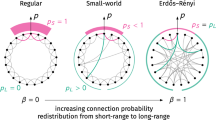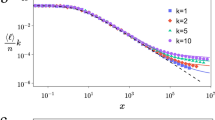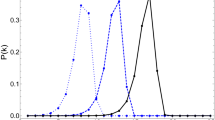Abstract
This paper considers a scalable lattice that may be used to generate models of random small world networks. We describe its properties and investigate its robustness to random node failures. We also define group and reachability coefficients to characterize the properties of the network. Simulation results are presented that show that the new coefficients well describe a social network.
Access this chapter
Tax calculation will be finalised at checkout
Purchases are for personal use only
Preview
Unable to display preview. Download preview PDF.
Similar content being viewed by others
References
Barabasi, A., Albert, R.: Emergence of Scaling in Random Networks. Science 286(5439), 509–512 (1999)
Caverlee, J., Liu, L., Webb, S.: The socialtrust framework for trusted social information management: Architecture and algorithms. Information Sciences 180(1), 95–112 (2010); Special Issue on Collective Intelligence (2010)
Haythornthwaite, C.: Social network analysis: An approach and technique for the study of information exchange. Library & Information Science Research 18(4), 323–342 (1996)
Knuth, D.E.: The Art of Computer Programming, 2nd edn. Sorting and Searching, vol. 3. Addison Wesley Longman Publishing Co., Inc., Redwood City (1998)
Monclar, R., Tecla, A., Oliveira, J., de Souza, J.M.: Mek: Using spatial-temporal information to improve social networks and knowledge dissemination. Information Sciences 179(15), 2524–2537 (2009)
Ni, Y., Xie, L., Liu, Z.-Q.: Minimizing the expected complete influence time of a social network. Information Sciences 180(13), 2514–2527 (2010)
Parakh, A., Kak, S.: A key distribution scheme for sensor networks using structured graphs. In: International Conference on Emerging Trends in Electronic and Photonic Devices Systems, ELECTRO 2009, pp. 10–13 (December 2009)
Parakh, A., Kak, S.: Efficient key management in sensor networks. In: 2010 IEEE GLOBECOM Workshops (GC Wkshps), pp. 1539–1544 (December 2010)
Stoica, I., Morris, R., Liben-Nowell, D., Karger, D.R., Kaashoek, M.F., Dabek, F., Balakrishnan, H.: Chord: a scalable peer-to-peer lookup protocol for internet applications. IEEE/ACM Transactions on Networking 11(1), 17–32 (2003)
Varshney, L.: Local fidelity, constrained codes, and the meru prastara. IEEE Potentials 27(2), 27–32 (2008)
Watts, D.J., Strogatz, S.H.: Collective dynamics of ‘small-world’ networks. Nature 393, 440–442 (1998)
Author information
Authors and Affiliations
Editor information
Editors and Affiliations
Rights and permissions
Copyright information
© 2012 Springer-Verlag Berlin Heidelberg
About this paper
Cite this paper
Parakh, A., Kak, S. (2012). A New Small World Lattice. In: Thilagam, P.S., Pais, A.R., Chandrasekaran, K., Balakrishnan, N. (eds) Advanced Computing, Networking and Security. ADCONS 2011. Lecture Notes in Computer Science, vol 7135. Springer, Berlin, Heidelberg. https://doi.org/10.1007/978-3-642-29280-4_1
Download citation
DOI: https://doi.org/10.1007/978-3-642-29280-4_1
Publisher Name: Springer, Berlin, Heidelberg
Print ISBN: 978-3-642-29279-8
Online ISBN: 978-3-642-29280-4
eBook Packages: Computer ScienceComputer Science (R0)




